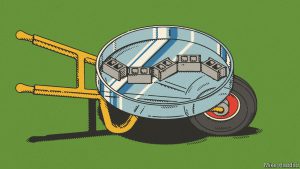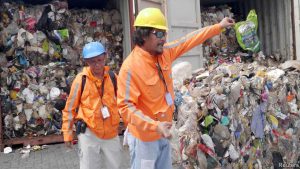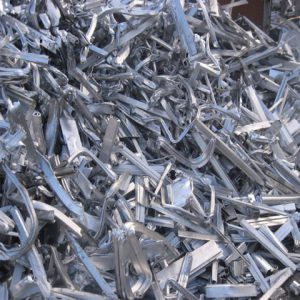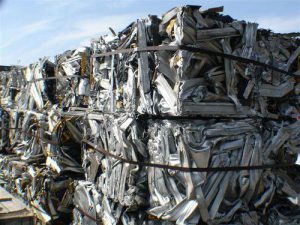Author: Judy Skatssoon
24 October, 2019
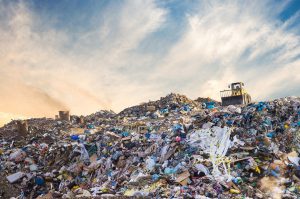
A process known as autoclaving promises to divert up to 96 per cent of household waste away from landfill.
A Polish company building an Australia-first high-tech waste treatment plant in Nowra has been holding talks about the technology with other councils across NSW and Victoria.
Shoalhaven City Council has contracted Bioelektra Group to build and operate the $100 million processing plant that promises to dramatically reduce the need for waste separation and relieve pressure on landfill.
Bioelektra in January beat local competitors to be named by Shoalhaven as the successful tenderer for the plant, which will transfer to Council after 20 years.

(Byproducts produced via autoclaving on display at Waste Expo Australia this week.)
“We’re still in the process of signing the agreement and then we’ll move on to getting EPA approval,” Bioelektra Development Manager Michal Paca, visiting Melbourne from Poland for Waste Expo Australia, told Government News.
Bioelektra plans to have the plant up and running by 2021, Mr Paca said.
Mr Paca says the technology represents a cultural shift in waste management, and removes the need for complex and confusing waste separation systems.
“What’s exciting for me is we actually give people the opportunity to focus on not producing waste. I believe this technology supports that transition to people actually thinking about their consumption habits.”
State of the art separation
The technology works by drying shredded mixed household waste using a high-pressure steaming process known as “autoclaving”, which reduces the volume of the waste by about 17 per cent.
It then automatically sorts 65 per cent of the processed waste into a range of byproducts that can be recycled for a range of uses including insulation batts, bricks and road base.
The remaining non-recyclables are sorted for use as Refuse Derived Fuel (RDF), which can be used as an alternative fuel and is turned into gas in non-combustion ovens and used to power the plant.
“It eliminates the need for source segregation to a major extent,” Mr Paca says. “We can’t deal with hazardous waste or construction waste, but you don’t need anyone to separate metal, plastic, glass or food waste. We handle that part.”
The cost of processing waste is $265 per tonne, Mr Paca says.
The first industrial scale Bioelektra plant opened in Poland in 2013 and the company is in the process of bringing the technology to other parts of the world including Slovakia, Russia, Israel and Belgium.
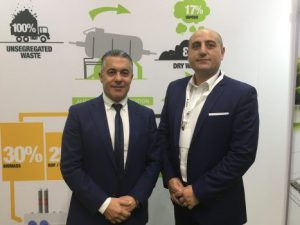
(Bioelekra Australia Managing Director Fred Itaoui (L) and General Manager Michael Lobos at Waste Expo Australia on Wednesday.)
Bioelektra Australia General Manager Michael Lobos told Government News the technology, which could save more than 90 per cent of household waste from going to landfill, solved a problem for Shoalhaven Council which only had five years of life left in its landfill facility.
“The advantage is that the diversion rate from landfill is going to be 96 per cent, so very little will end up in landfill, and the lifespan of the current landfill is going to be extended from five years to 50 years,” he told Government News.
“It’s sustainable and it’s not a complicated system – everything into one bin, no segregation at source and the resource recovery rate is very high.”
Managing Director Fred Itaoui said the company is in talks with other councils across Melbourne and Western Sydney who have expressed interest in the concept.
“We have had quite a number of discussions in NSW and Victoria,” he said.
Too much emphasis on recycling
Mr Paca told the Waste Expo that 80 million tonnes of packaging is produced globally each year, with 30 per cent being incinerated and 30 per cent ending up as land or ocean fill.
Governments are getting it wrong by putting the emphasis on separation and recycling, he says, which distracts from the real problem of reducing waste.
The emphasis in recycling, rather than reduction, not only exonerates consumption, he says, but distracts what he says is the “scene of the crime” – the producers and retailers who should be being offered sticks and carrots by government to deal with their own waste.
“Waste collection, waste separation, is a distraction from the real goal, which is buying things that do not produce waste,” he told delegates.
“Technology that is focused on recycling is not solving the real problem.”
“Truth is we do not need more recycling. Truth is we need less waste.”
Link: https://www.governmentnews.com.au/australia-first-waste-solution-sparks-interest-from-councils/
